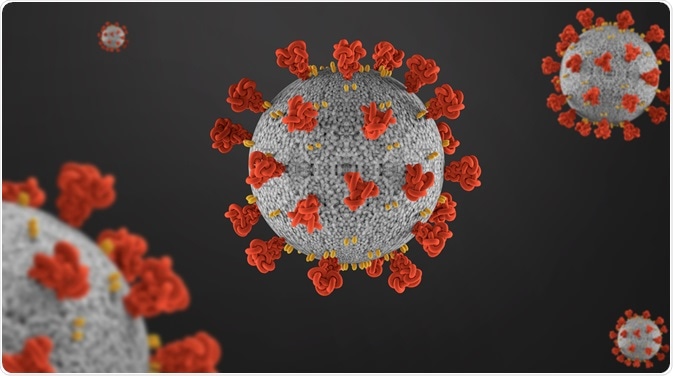What are Angiotensin-Converting Enzyme Inhibitors?

Cardiovascular illnesses, such as high blood pressure and heart problems, are often treated with angiotensin-converting enzyme (ACE) inhibitors. The ACE inhibits lower blood pressure by relaxing veins and arteries. They have recently received a lot of attention due to their suspected role in increasing the fatality of COVID-19.

Image Credit: Kateryna Kon/Shutterstock.com
How do ACE inhibitors work?
The precise mechanism of ACE inhibitors is not well known, apart from that they interfere with the renin-angiotensin-aldosterone system while not directly related to renin levels in the blood. ACE inhibitors target an enzyme involved in the production of angiotensin II from angiotensin I.
Angiotensin II narrows the body’s blood vessels (also called vasoconstriction) which can contribute to high blood pressure and thus affects the heart. In addition to this, angiotensin II causes the release of hormones that raise blood pressure.
ACE inhibitors prevent the production of angiotensin II, and therefore effectively stop the increase in blood pressure. The decreased angiotensin II levels also inhibit the remodeling of smooth muscle and cardiac myocytes. It is also hypothesized that ACE inhibitors disturb the degradation of bradykinin. Bradykinin is a peptide causing vasodilation.
Use and effects of ACE inhibitors
While the main use of ACE inhibitors is in reducing blood pressure, they can also be used for coronary artery disease, diabetes, migraines, and certain chronic kidney diseases. They are a relatively safe form of treatment, but they are still closely monitored.
There is evidence that the effectiveness of ACE inhibitors differs by age and race, which is why their use is sometimes inconsistent. One of the more common side effects of ACE inhibitors is the development of a dry cough, which occurs in 10% or less of users. There is no clear treatment for this cough.
One of the most significant side effects of ACE inhibitors is angioedema, which can affect the tongue, glottis and/or larynx and thus obstruct the airways. Angioedema occurs more commonly in the African American population than other racial groups in America, but treatments of angioedema are varied. Some evidence shows that adrenaline can help, whereas newer research has indicated that bradykinin blocking agents can improve angioedema.
There are some cases where ACE inhibitors can be contraindicated, meaning they can be more harmful than beneficial. This can be the case in patients with a history of angioedema, either in their medical history or in their family history.
In addition to this, ACE inhibitors are contraindicated in patients taking direct renin inhibitors and patients who are pregnant as this can cause skull hypoplasia, anuria, hypotension, skeletal deformations, and death.
Lastly, ACE inhibitors can be dangerous when used in combination with angiotensin II receptor blockers (ARBs), as it can cause life-threatening hyperkalemia in patients with heart failure.

Image Credit: hafakot/Shutterstock.com
ACE inhibitors and COVID-19
There have been concerns that ACE inhibitors can increase susceptibility to COVID-19. These concerns have been based on the biological plausibility of such an effect and the observation that patients with hypertension and other cardiovascular comorbidities are overrepresented among those with poor COVID-19 outcomes.
On the other side, there is some speculation that ACE inhibitors can have a beneficial role in COVID-19, based on some clinical studies in patients with other viral respiratory infections.
Current research on this subject is varied. Research on comorbidities has found that those with hypertension have a 70% higher risk of death than others from COVID-19, whereas other studies predict more drastic differences of around 200% higher risk of death. Since hypertension is often treated with ACE inhibitors, they were suspected to have a confounding role in the severity of COVID-19.
One of the targets of ACE inhibitors, angiotensin-converting enzyme 2, is a co-receptor for viral entry of the virus, SARS-CoV-2. It has furthermore been implicated in the extended pathogenesis of COVID-19. However, no studies have looked at the direct link between the gene expression of angiotensin covering enzyme 2 and COVID-19 pathogenesis and mortality.
The World Health Organization’s report does not indicate that ACE inhibitors have detrimental effects in relation to COVID-19. Of 11 observational studies they analyzed, a history of using ACE inhibitors was not associated with increased severity of COVID-19.
This sentiment has been echoed by the Council on Hypertension of the European Society of Cardiology, the American Heart Association, the Heart Failure Society of America, and the American College of Cardiology. However, no studies have looked at the potentially beneficial role of ACE inhibitors could have.

Image Credit: GEMINI PRO STUDIO/Shutterstock.com
Sources
- Mayo Clinic. 2019. Angiotensin-Converting Enzyme (ACE) Inhibitors. [online] Available at: <https://www.mayoclinic.org/diseases-conditions/high-blood-pressure/in-depth/ace-inhibitors/art-20047480> [Accessed 7 June 2020].
- World Health Organization. 2020. COVID-19 And The Use Of Angiotensin-Converting Enzyme Inhibitors And Receptor Blockers. [online] Available at: <https://www.who.int/news-room/commentaries/detail/covid-19-and-the-use-of-angiotensin-converting-enzyme-inhibitors-and-receptor-blockers> [Accessed 7 June 2020].
- Herman LL, Padala SA, Annamaraju P, et al. Angiotensin-Converting Enzyme Inhibitors (ACEI). In: StatPearls [Online]. Treasure Island (FL): StatPearls Publishing; 2020 Jan-. Available from: <https://www.ncbi.nlm.nih.gov/books/NBK431051/>
- Patel, A., and Verma, A., 2020. COVID-19 and Angiotensin-Converting Enzyme Inhibitors and Angiotensin Receptor Blockers. Journal of the American Medical Association, 323(18), pp.1769-1770.
Further Reading
- All Coronavirus Disease COVID-19 Content
- What Mutations of SARS-CoV-2 are Causing Concern?
- What is the Clinical Impact of COVID-19 on Cancer Patients?
- Can Pets Get COVID-19?
- An Overview of the SARS-CoV-2 Vaccines
Last Updated: Jun 10, 2020

Written by
Sara Ryding
Sara is a passionate life sciences writer who specializes in zoology and ornithology. She is currently completing a Ph.D. at Deakin University in Australia which focuses on how the beaks of birds change with global warming.
Source: Read Full Article